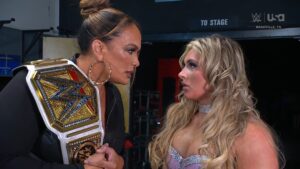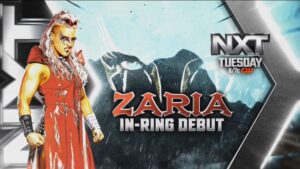Cymru am byth! Or as they say in that other (perhaps more famous) British language: Wales forever! Welsh wrestling is rich with history. It can be traced back to the early half of the 20th century, when performers such as Atholl Oakeley and former professional Rugby League player Sandy Orford were in their primes during the 1940s and 50s. It is a history which continued to grow, when the likes of Orig Williams took Welsh wrestling to the next level during the 1960s and 70s – showcasing it to new audiences and himself working worldwide to display his brand of Welsh in-ring work. So join us, ffrindiau (friends), as we take a brief stroll through Welsh wrestling history.

Whereas Welsh wrestling had been taking place as early as the 19th century (perhaps earlier), the first two men to modernise Welsh professional wrestling were Atholl Oakeley (1900 – 1987) and Sandy Orford (1911 – 1986). Both men were true pioneers; paving the way for future generations of Welsh wrestlers and helping turn Britain into a hotbed of professional wrestling – something it remains to this day. Oakeley, for example, was Britain’s first British Heavyweight Champion (the British equivalent of the NWA Championship), winning the title in 1930 – successfully defending it for five years before retiring in 1935, causing the title to be vacated. Sandy Orford was Wales’ big star of the 1940s, famously facing off with the legendary Lou Thesz three times – scoring a draw and two losses. In 1952, he would pin the man known as Shirley Crabtree in Crabtree’s debut match – the same Shirley Crabtree who would go on to become arguably Britain’s most famous wrestler, Big Daddy.

During the 1960s and 70s – when British wrestling was running wild, with promotions such as World of Sport staking their claim to the mantle of being one of British households’ most beloved weekly shows – Wales played its part in producing some of the finest performers wrestling has ever seen. Perhaps most notably of all was Orig Williams (born 1931) – known in the United States as “El Bandito“, because of his epic handlebar moustache – a North Walian who played perhaps the biggest role in putting Welsh wrestling on the map. He worked shows in Britain; in the United States; in India, Pakistan, South East Asia… he performed everywhere. At one time, he was arguably the most in-demand worker on the entire wrestling circuit. He advocated a strong, hard-hitting style of wrestling, in-line with the old-school mentality that maneuvers had to look real – “if you can’t stand the heat, get out of the kitchen” was a catchphrase of his, because of his approach to wrestling.

More than just a performer, El Bandito was an equally successful promoter – presenting the Welsh wrestling show “Reslo” (“wrestling”) on Welsh speaking TV channel S4C in the 1980s. Reslo featured matches from Orig’s British Wrestling Federation, as well as Windy City Wrestling (USA) and a handful of matches from Germany. Reslo played an important part in introducing gimmick matches – cage matches, chain matches etc – to Welsh television and, famously, brought back women’s wrestling. In the 1980s, women’s wrestling was banned in Britain, with Wales being the only country allowed to showcase it. Therefore, Reslo was highly influential in women’s wrestling once again being displayed in Britain and playing a part the ban being lifted. The first thing you would notice about Orig Williams was his notoriously strong Welsh accent – normal for someone born in the predominantly Welsh speaking village of Ysbyty Ifan. He was a lifelong advocate of preserving the Welsh language and spoke it whenever he could, which is why Reslo was a 100 percent Welsh speaking television programme. El Bandito sadly passed away in 2009, but left behind an unmatched legacy in Welsh wrestling.
With Williams’ death in 2009, Welsh professional wrestling was inherited by Alan Ravenhill‘s “Welsh Wrestling” and Steve Saxon‘s rival promotion “Britannia Wrestling Promotions“, the latter being my local promotion and having featured stars such as Pete Dunne, Jack Gallagher and The Babyface Pitbull. If you have got a favorite British wrestler currently working in the United States or Japan, they have probably worked shows for BWP at some point. Both promotions tour Wales regularly; carrying on the legacy of their respective promoters’ mentor, El Bandito, and bringing enjoyment to the thousands of wrestling fans present in the country. Speaking of Pete Dunne, he is a part-owner of another significant (and arguably the biggest) Welsh promotion, ATTACK! Pro Wrestling, alongside Mark Andrews and Chris Brookes. ATTACK! Pro Wrestling regularly puts on shows featuring strange, never seen before gimmick matches (something that it can be argued they inherited from Reslo); adding to the fun experience that is an ATTACK! show. In short, Welsh wrestling is thriving and there are numerous other Welsh independents striving to make a name for themselves.
Internationally, Welsh wrestling is doing as good as ever, with Welsh wrestlers such as Tegan Nox, Mark Andrews, Eddie Dennis, Morgan Webster and, previously, Mason Ryan having made a name for themselves in the WWE. With NXT UK now present in the UK and the rest of the British indie scene in the middle of a boom period, it’s a certainty that Welsh wrestling will continue to grow and that more Welsh stars will be made. Tegan Nox (a great ambassador for Welsh wrestling), for example, is someone who has the potential to become one of Wales’ biggest stars ever – and one of Britain’s. She was announced as a participant in the 2017 Mae Young Classic – representing Wales – but had to pull out with a knee injury. However, that was not the end for Nox, who would return to the WWE in time for the 2018 Mae Young Classic – again representing Wales – where she would be eliminated in the quarter-final by fierce rival, Rhea Ripley; she suffered a couple of nasty injuries during the match and has been out of action since, though feuding with Ripley on Twitter. It is a certainty that this feud is far from over.
Andrews, Webster and Dennis, too, all have a role to play and are doing the country proud – representing Welsh wrestling whilst carving a name for themselves. Andrews, for example, was a participant in the 2017 WWE United Kingdom Championship Tournament, where he made it to the semi-final – losing to fellow ATTACK! owner, Pete Dunne. He has also featured in numerous 205 Live episodes. Webster featured in the 2018 United Kingdom Championship Tournament – losing against eventual winner, Zack Gibson, in the semi-final. Like Andrews, he has also featured for 205 Live on numerous occasions. Whereas Eddie Dennis will certainly not feature for 205 Live anytime soon, the 6 ft 6 Welshman (and former ATTACK! Heavyweight Champion) will continue to feature for the NXT UK brand, hoping to one day capture the NXT UK Championship and maybe gain a place on the WWE main roster. There hasn’t been a greater time to be a Welsh wrestler and it’s a certainty that there will be more to look out for in the coming years.
Welsh wrestling will continue to grow in the coming years. With more and more Welsh wrestlers getting opportunities to showcase their talents overseas, they’ll continue to act as ambassadors – like Orig Williams before them – and make more international fans take notice of the sensational anomaly that is Welsh professional wrestling. If you don’t like it, then get out of the kitchen.






